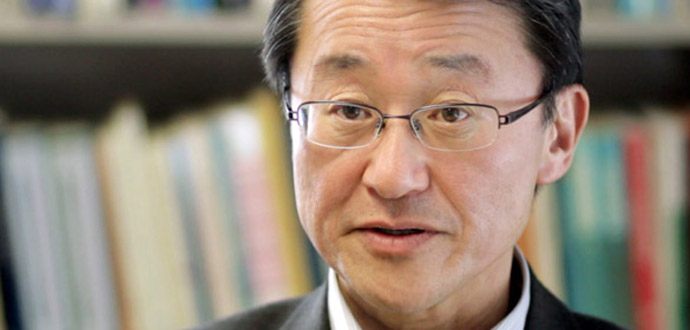
Shigeru Miyagawa, Professor of Linguistics & Kochi-Manjiro Professor of Japanese Language and Culture, and recent chair, MIT OpenCourseWare Faculty Advisory Committee.
Professor Shigueru Miyagawa is one of OCW’s most prolific participants, and a long-standing member and recent chair of the OCW Faculty Advisory Committee. As he’s told us:
“To be able to offer teaching materials through OCW is one of the best things that can happen to you as a teacher. It’s like hitting the lottery to touch so many people through your teaching. It’s also good because it keeps you on your feet, knowing that tens of thousands people might be watching.”
In a recent interview with Compass Higher Education Consulting for a forthcoming book on educational leadership, Prof. Miyagawa was asked about the future of OCW. He goes straight to the relationship between OCW and MOOCs, specifically their different conceptions of “open”:
“OCW started this idea that online education can be wide open and free. And the most recent trends are these MOOCs. I think what we are going to find is some integration between the two.
MOOCs are different from OCW in that they are a fully integrated course from beginning to end, with assessment. And they are time limited in the sense that they are available when they are offered, just like a regular course.
OCW is in some ways the exact opposite. It is wide open. It’s available anytime. And you study at your own pace. I think what we’ll find is that OCW will begin to take on some of the MOOC features like putting some assessments on the self-learning content, so that learners can check their understanding. That will be a great service.
MOOCs will be impacted by OCW, in that MOOCs right now despite this “open” in the name MOOC, massive open online course, they’re not really open. The “open” in MOOC only refers to open access during the time that it’s being offered. The “open” in OCW is a much more of a dynamic concept—it’s wide open and you can download it and you can access it anytime. MOOCs will have to take on some of the dynamic openness of OCW, if it’s going to have the impact that it should have.
We have to start clearing copyright for materials on MOOCs. Right now MOOCs are for the most part closed in that way, you see all rights reserved, which means copyright has not been cleared. So learners basically are passive learners—they look at the video, they read the teaching materials, and so forth, but they cannot download and create their own.
And yet, we know that best learning happens when you are able to actively interact with the teaching materials.
That’s what I hope will happen, I’m pushing for it.”

Reblogged this on Arcanus's Random Stuffs.
[…] As we’ve recently highlighted, Professor Miyagawa is a long-time champion of OCW and open sharing of educational resources. He has served on OCW’s Faculty Advisory Committee since OCW’s inception in 2000 and was chair of the committee from 2010–2013. […]
[…] Professor Shigeru Miyagawa has been a long-time champion of online education and open sharing. Now we can add “flipped classroom advocate” to that […]